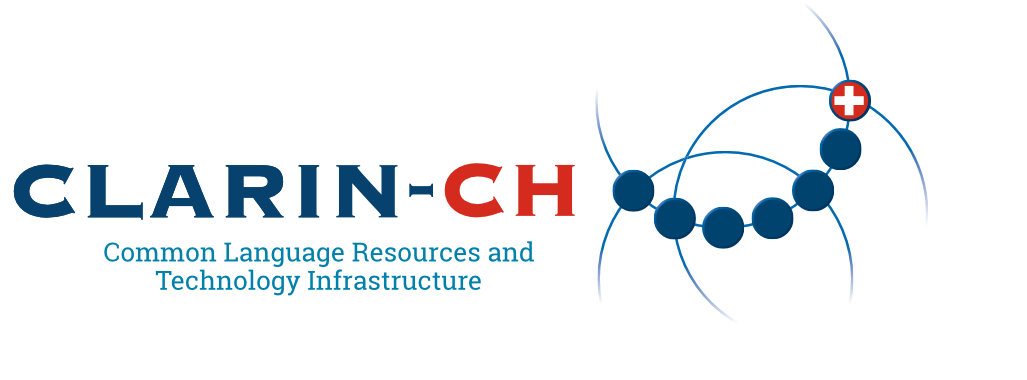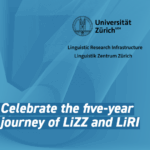On June 11, 2025, celebrations took place to mark the 5th anniversary of CLARIN-CH and Switzerland’s membership in the European CLARIN infrastructure. Short speeches and celebratory remarks were delivered by several persons who have played, and will continue to play, a significant role in shaping CLARIN-CH.

Following the welcome address by Anita Auer (UNIL), President of the CLARIN-CH Consortium, Cristina Grisot, National Coordinator of CLARIN-CH, gave an overview of the history and achievements of CLARIN-CH since its foundation in December 2020. Cristina Grisot emphasized that CLARIN-CH’s offerings are user-driven, based on insights from the first CLARIN-CH community survey, conducted in autumn 2025. She also explained the composition of the CLARIN-CH infrastructure ecosystem and expressed her gratitude to all partners for their significant contributions to the CLARIN-CH working groups, the creation of the CLARIN-CH Documentation Platform, the development and operation of a national corpora platform, and the organization of various training opportunities.
The national infrastructures collaborating with CLARIN-CH also had the opportunity to present themselves, their services, and their perspectives on integration within CLARIN-CH:
- UZH Linguistic Research Infrastructure (LiRI), offering services covering the entire data life cycle, along with the LiRI Corpus Platform (LCP) and the swissdox@LiRI media database.
- ZHAW Digital Discourse Lab, which is developing the Swiss-AL platform – a Language Data Platform for Applied Sciences.
- Language Repository of Switzerland (LaRS), responsible for the publication and curation of language data in the SWISSUbase national repository.
The pitches continued with a word by Elisabeth Stark, Vice President Research at UZH, who highlighted the important achievements in linguistic research at UZH that paved the way for the creation of CLARIN-CH. She emphasized that CLARIN-CH is not merely hosted at UZH—it embodies the university’s strategic goals. As the host institution, UZH provides CLARIN-CH with an ideal environment in which to thrive: the Linguistic Research Infrastructure (LiRI) serves as a unique technical and national backbone, supported by educational programs rooted in Open Science, career-stage-appropriate training, and a strong strategic focus on interdisciplinary collaboration.
Henk van den Heuvel, from the CLARIN Board of Directors, also joined the celebration and presented the European CLARIN infrastructure, its member countries, and Switzerland’s contribution to achieving CLARIN’s vision: to ensure that all digital language resources and tools from across Europe and beyond are accessible through an online environment in support of research in the humanities and social sciences.
Lea Bühlmann, from the State Secretariat for Education, Research and Innovation (SERI), explained the work carried out by the ERIC team to support Switzerland’s participation in several European research infrastructures of the ERIC type (European Research Infrastructure Consortium)—a specific legal entity that facilitates the joint creation and operation of research infrastructures of European importance. She also noted that the ERIC team is working towards developing a model to assess the impact of Switzerland’s participation in ERICs, such as CLARIN ERIC.
Looking toward the future, Noah Bubenhofer (LiRI Steering Committee) and Andrea Rocci (USI) presented the vision for a future Swiss Federated Research Infrastructure for Language Sciences. Swiss-FRILS represents an infrastructure consortium designed to support language science research across Switzerland. It builds on existing facilities, services, and software, while introducing innovative technical solutions to foster the diversification of research methods and communities. Swiss-FRILS will operate within the CLARIN-CH framework. Given Switzerland’s membership in CLARIN ERIC, a national federated infrastructure is the most suitable structure to host CLARIN-CH and serve as the Swiss node of CLARIN.
The series of pitches concluded with a presentation of the Swiss Social Sciences and Humanities Open Cluster (SSHOC-CH) by Georg Lutz (FORS), followed by an overview of the CLARIN-CH workplan for 2025–2028 by Cristina Grisot. SSHOC-CH is an association led by Georg Lutz (Chair) and Cristina Grisot (Vice-Chair), with the mission to create a cluster of SSH research infrastructures in Switzerland. Its goals are to foster exchange and cooperation among infrastructures in support of research projects and researchers, to identify and develop synergies, and, where possible, to develop joint platforms and services or make existing ones interoperable.
Expanding beyond CLARIN-CH itself—to initiatives such as SSHOC-CH and EOSC (European Open Science Cloud)—is a key part of CLARIN-CH’s strategic vision. This has become essential given the dynamic and rapidly evolving landscape of Open Research Data (ORD) and Open Science. The CLARIN-CH workplan for 2025–2028 includes several key priorities:
- collaborating with Swiss higher education institutions (HEIs) to consolidate the current infrastructure ecosystem and the underlying national HEI network under the umbrella of the Swiss-FRILS project;
- designing and implementing a national training program to enhance data literacy, promote data reuse, and support best practices in open research data management;
- developing a model to ensure the long-term sustainability of CLARIN-CH, covering aspects such as governance, financing, human resources, language resources, and services;
- carrying out community engagement activities, such as organizing workshops and training sessions, hosting an annual CLARIN-CH Day, conducting regular surveys to identify user needs and gather feedback, and distributing newsletters.
The CLARIN-CH coordination team is thankful to everyone who has been involved and contributed to its development—researchers, professors, data management experts, research support staff, open science professionals, rectors and vice-rectors, members of the Academy for Human and Social Sciences, and many others. The team looks forward to the continued collaboration in the years to come.


